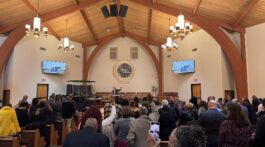“I will show you the bride, the wife of the Lamb”
I like to compare baptism with marriage. It’s not a new notion, since John penned it under Divine Inspiration in Revelation. However, the comparison of modern marriage with the centuries-old practice of baptism is problematic. First, the concept of modern marriage is flawed by a gamut of worldly problems: common law practices, homosexuality, political agendas, and divorce are just a few. A lot of vows of marriage end in divorce attorneys and custody battles.
In reality more thought is put into the diamond-set of the engagement ring and the first course of the reception, than the actual marriage. I actually just read an article stating that the higher the cost of the engagement ring, the shorter the length of the marriage. The problem is that the “circumstance” is not taken as seriously as the “pomp”. There is more to the marriage than the wedding, and there is more to Christianity than the baptism. The wedding is essential, the baptism is essential, but it’s the vows that carry us through a long-lasting relationship.
“For your Maker is your Husband”
In many modern churches on baptism morning there is either a baptistry filled with water, or a nearby river or lake waiting. There is usually some speech about the individual’s road to Jesus, then (at least in our church) there are some questions. The minister usually recites several beliefs to which the baptismal candidate says “yes”, and so we proceed. We do this because in our church, as in some others, when you are baptized you aren’t just joining the brotherhood of Christianity but also our specific church. This is not to be taken lightly. When you join a church, you are joining a family. You have your crazy uncles, the feuding cousins, the closet-meat-eaters, and somehow you have to fit in with them.
When you get married, you see your in-laws for holidays, and maybe other family gatherings. When you join a church, you see these people every week (at the very least). These are people you want to confide in, to share your prayers and praises with, to explain your temptations and gain support. But a lot of times when someone joins our church we clap, praise God, maybe shed a tear when they’re dunked under that water, give them a hug afterward with a “welcome to the family”, and then go about our business. How many people join our churches and fall right through the cracks just months or a few short years later?
The truth is, there is more to the commitment of baptism and church membership than those initial questions. Those fundamental beliefs that they believe in the beginning are not what will hold this relationship together–their relationship with the church family and their relationship with God.
When I got married I made vows to my husband. I vowed to love, honor, and cherish. We used words like “in sickness and in health…for richer or poorer…as long as we both shall live.” Did I believe in my husband? Yes. But that wasn’t the focus of the ceremony. The ceremony was about a vow. I vowed that day to let him be my husband no matter what.
That is what we vow to God at baptism.
“I go to prepare a place for you”
God makes many promises to His people in the Bible. My favorite, and one that gets a lot of focus, is that He is making a place for us in heaven, and will save us from this life, and take us to our place. Much like a traditional romance, Jesus courts us. He loves us, takes care of us, commits to us, and is preparing a place for us to be with Him. Then when the time is right, He is coming back for us. The Church will be the blushing bride, and we are the Church.
God makes promises to us, but our promises to Him come out in our most desperate moments. As a preteen I had my first drink of alcohol. As a result I spent weeks crying myself to sleep telling God that I would never drink again (or break any other rules) as long as I could still go to heaven. I’ve heard other stories of kids making deals with God–they’ll be a missionary if their parents don’t get divorced. Even adults make desperate vows to God–they’ll start going to church if they survive this illness.
These are vows that we may mean, and we may even keep them, but how often do we make a vow with a clear mind and a steady hand? I’ve struggled with my baptism for many years. I was 10, and I knew all of the beliefs I was agreeing to. I grew up in this church that I was finally officially joining. But I was never happy with the decision, especially when I reached adulthood, and I finally understand why.
At the age of 10 I didn’t understand the commitment that should be made at baptism–the vow that comes with a relationship with Jesus. In sickness and in health, for richer or poorer, till death parts us.
“I remember the devotion of your youth, your love as a bride, how you followed me in the wilderness, in a land not sown”
One of my favorite praise songs proclaims “blessed be Your name when the sun’s shining down on me”, and “on the road marked with suffering.” Our devotion doesn’t mean much when we let our suffering come between us and our beloved, whether we’re talking about our beloved spouse or our beloved Creator. Our devotion doesn’t mean much when we don’t let that beloved help us out of the darkness when it comes.
During the darkest time in my life I didn’t feel God around me at all. I was doing everything I could to rebel against Him, because of the suffering He allowed in my own life. Then one day at a friend’s house I noticed a magnet on their refrigerator. It was a picture of hands, what looked like a father’s hands grasping a child’s. Words above the image read “God will never let go of your hand unless you first let go of His.” When I read those words I knew without a doubt that I had let go of God and that I had better find Him again.
That’s when I realized that I needed to make a vow to Him, and that I never had before. I needed to vow to be His no matter what. I had to let Him be my Master no matter what, and trust Him no matter what. He didn’t promise I wouldn’t have trials. He promised that He is making a place for me, and that He will come and take me there.
“My covenant that they broke, though I was their Husband”
God made a covenant to His church which He plans to uphold regardless of our faithfulness. If a wife breaks a marriage vow, does it change the fact that she is the wife? If we break a vow to God, does it change the fact that we are His creation, His children, and His people? It doesn’t. A vow focuses on relationship. It is a bond; each party receives something from the arrangement, and when both uphold their part it is a beautiful thing.
I have a friend who has been struggling with health problems since I’ve known her. When I met her she didn’t know Jesus–at least not the One she knows now. The Jesus she knew was to blame for childhood abuse, for addiction and disorders, and for worldly circumstance. After talking with her this week I know that she knows a different Jesus now, the same one I met so long ago when I went searching for Him again. When I spoke with her she told me about how she is in a wheelchair. She can’t stand on her feet, can’t hold a pen, can’t drive a car. She can’t sing like she used to. By the end of the day she feels withered and exhausted. The symptoms she’s struggled with for years have finally culminated into a constellation of dots which have finally connected to make a diagnosis. She has muscular dystrophy, and it has progressed fast. All of the things she has aspired to are seemingly impossible.
My friend seems to understand that unspoken vow “in sickness and in health.” Physical illness is hard to reconcile with God, because He can heal us, can’t He? She doesn’t blame Him, but wants Him to use her instead. Emotional health can pull us away from God as well, like it did in my life. I think about that time and kick myself because I could’ve witnessed for Him during that time, but I didn’t. I missed that opportunity. Instead of showing God my commitment, like my friend is doing, I showed Him that this relationship is one-sided. I don’t want to do that again.
I don’t want to break the covenant. I want to praise His name in all things, because He completes us. He doesn’t only complete us in the good times. He completes us in the worst times as well.







